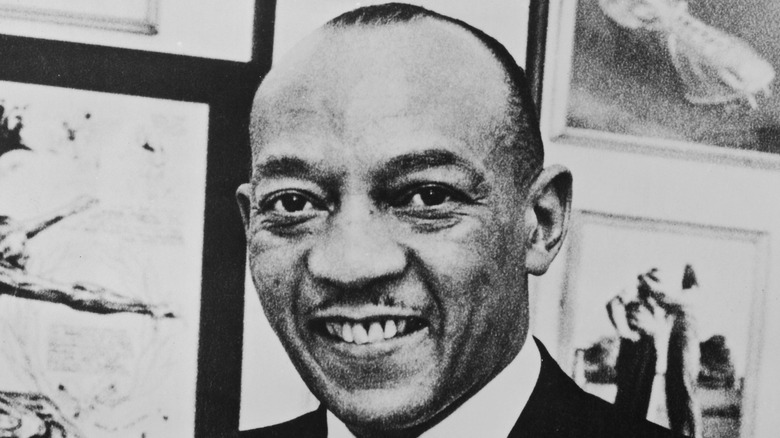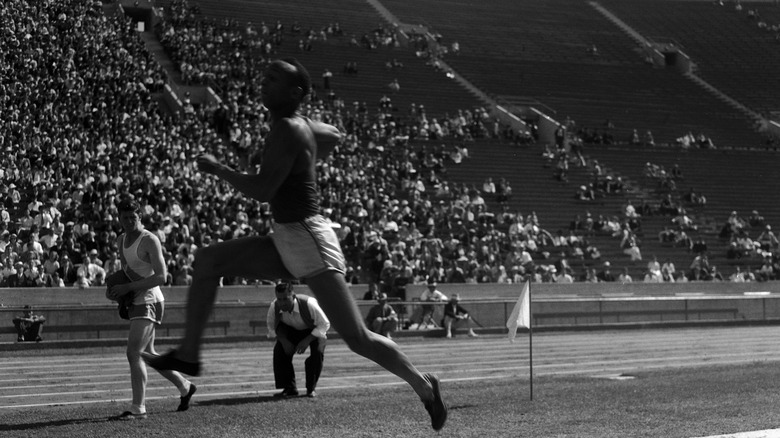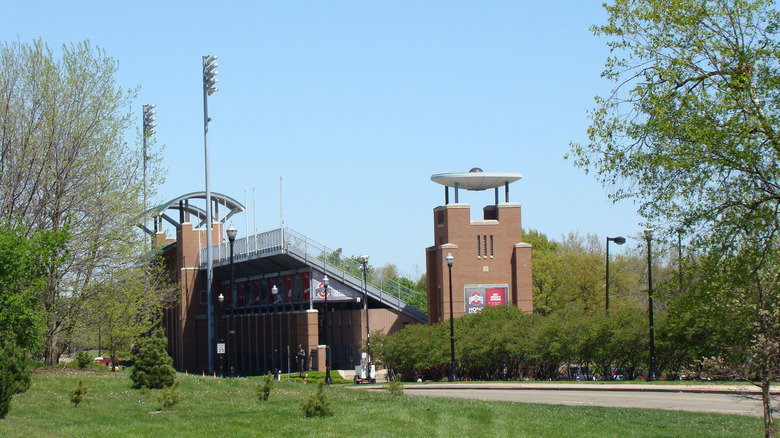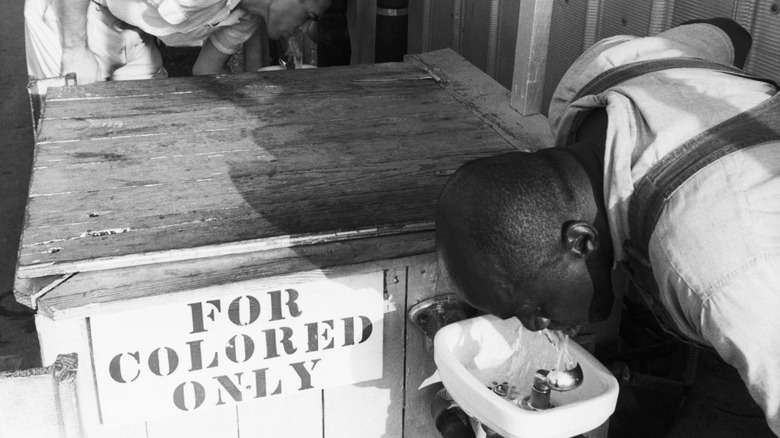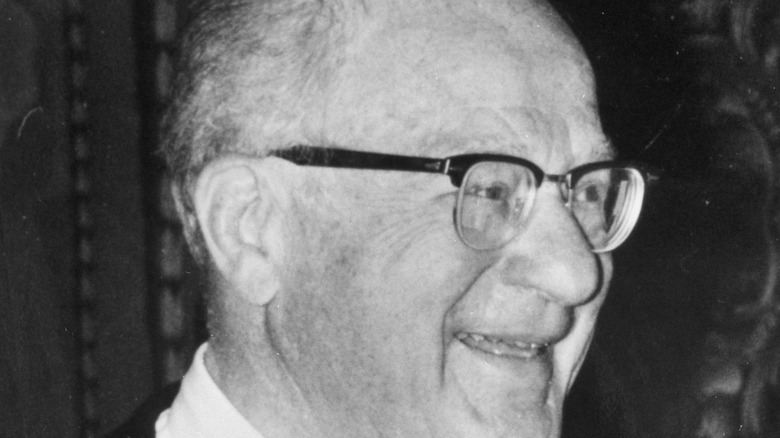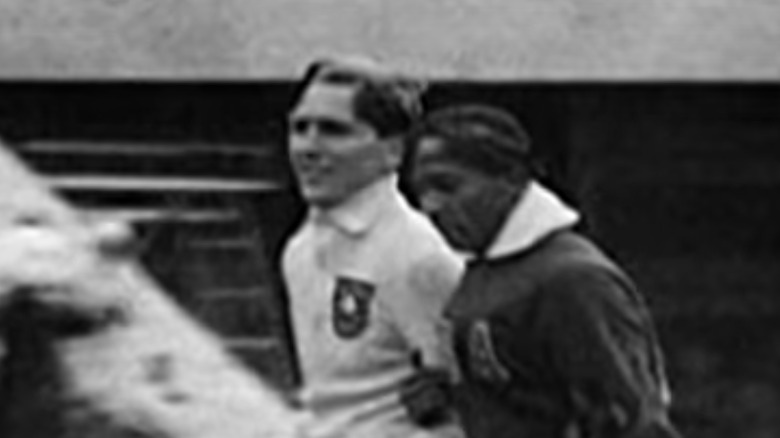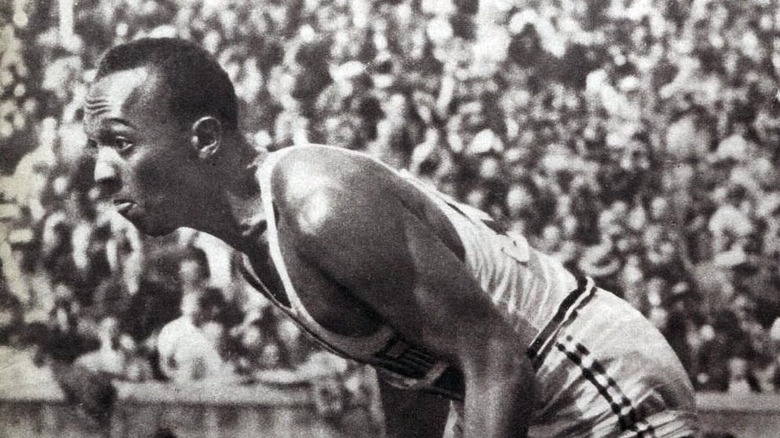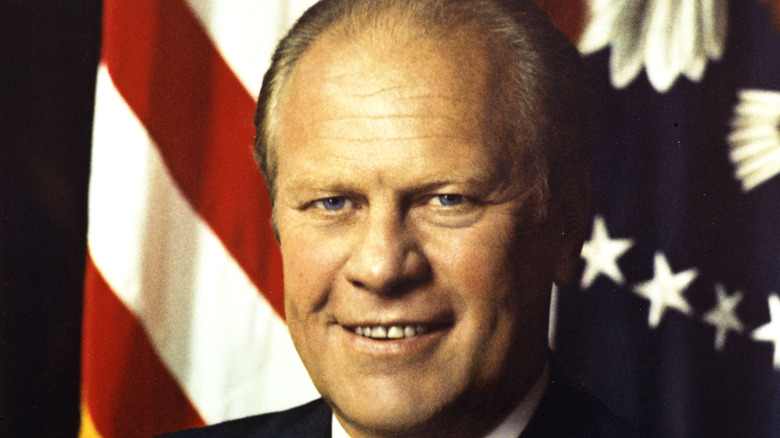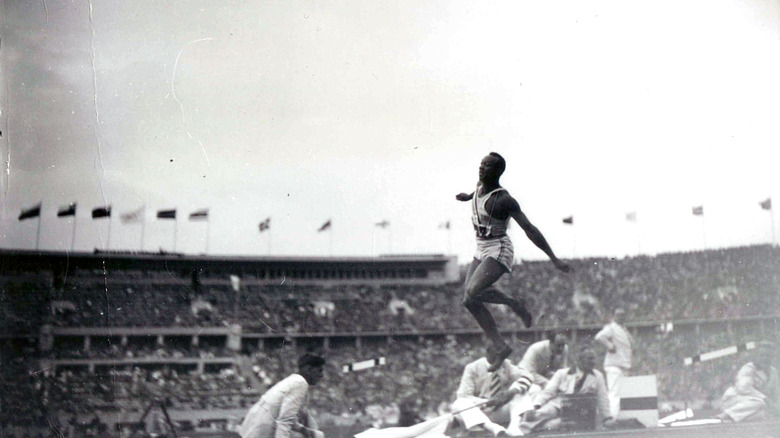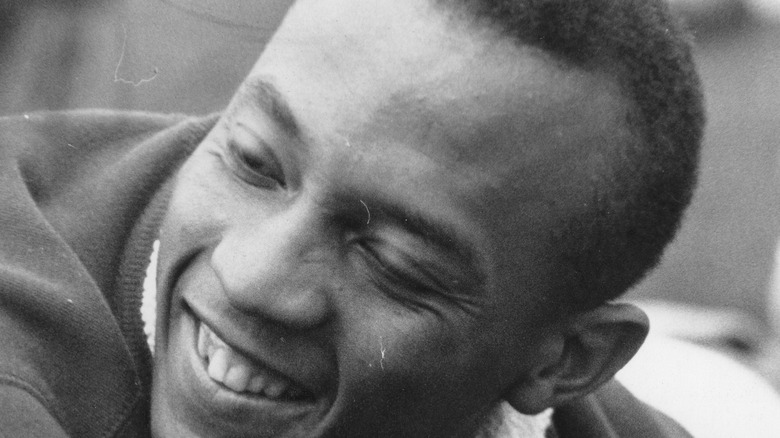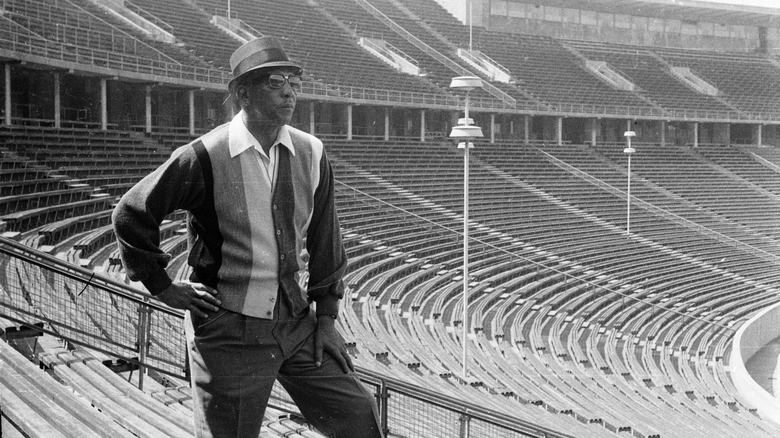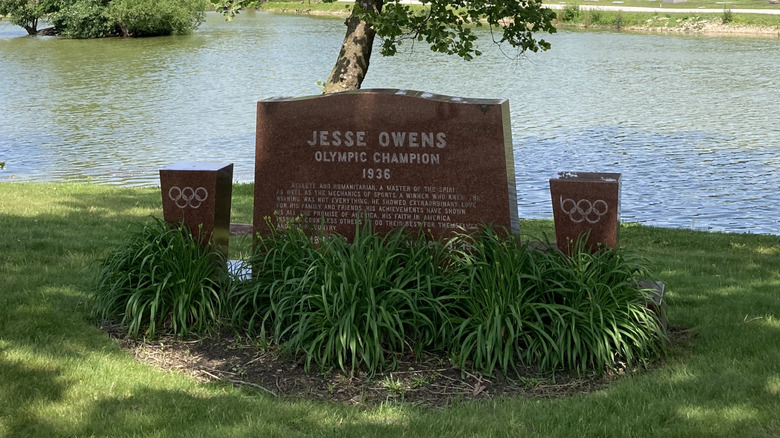Tragic Details About Jesse Owens
African-American track and field athlete Jesse Owens won four gold medals at the 1936 Olympics in Berlin, showing Adolf Hitler that Black athletes were the ones to watch and that his Aryan race theory was flawed, according to the New York Times. Owens also had an excellent time as a college star at Ohio State University, setting several world records in track. However, after the Olympics, his career as an athlete was essentially over. What happened?
Within a year, Owens was racing against horses, strongmen, and others to make money to feed his growing family. He launched several businesses, only for most of them to fail around him. Though he eventually became a public speaker and made a good living that way, he was also successfully prosecuted for tax evasion, as per the Times-News. Ultimately, Owens died at the age 66 from lung cancer after 35 years of being a pack-a-day smoker,
Despite being one of the greatest athletes in the world as a young man, Owens was still subject to Jim Crow laws as an African-American living in the U.S. Many of his hardships came down to the fact that he was a talented African-American athlete living in a time when that didn't mean much to anyone else around him, especially after the Olympics were over. Let's further examine tragic details around Jesse Owens's life.
Jesse Owens was born into brutal poverty
Born in Alabama, Jesse Owens was born into terrible poverty. His father, Henry Owens, was a sharecropper, subject to both the whims of the weather and white men, writes Time. Henry's livelihood was hard, and though Jesse often described his early life as terrible and poverty-stricken, he also said that knowing nothing else, he did not realize he was missing anything. Despite his descriptions of poverty, Jesse said he had been happy as a young child. When he was 9, in 1922, his mother moved the family to Ohio for a better education and life for her children, writes Jeremy Schaap in "Triumph: The Untold Story of Jesse Owens and Hitler's Olympics."
Even as a junior high school student, Jesse worked jobs after school to help out his family, including delivering groceries and working in a greenhouse. When invited to train with running coach Charles Riley, Jesse admitted that he could not train after school due to his jobs. Instead he had to eke out time before school. Thus his future as a track star was cemented.
He was not awarded on-campus housing or a scholarship at Ohio State University
Despite being accepted as an African-American athlete, Jesse Owens was forced to live off campus, as Ohio State University did not have on campus housing for Black students. Similarly, despite his caliber as a track and field athlete, Owens also was not given an athletic scholarship, according to Biography.
As a student, Owens was actually not given any scholarships at all and therefore worked as gas station attendant and, as per the New York Times, an elevator operator to pay his tuition, in-between training and classes. Even after he broke three world records and tied a fourth in May 1935, as a sophomore at Ohio State, no scholarships were awarded to him. By 1937, Owens couldn't continue to compete for Ohio State University due to his low academic standing as a result of taking time off to train and compete in the Olympics. Therefore, he left the university completely and began a long series of odd jobs, including working briefly as an entertainer that same year, writes Case Western Reserve University.
Despite being an athlete, he needed to obey Jim Crow laws
Jim Crow laws in cities were even more stringently upheld after the late 1880s, because beforehand they had not been fully enforced as they were elsewhere, writes History. Once African-Americans began to move to bigger cities, as the Owens' did as part of the Great Migration, white city dwellers began to speak up and demand that more restrictions be placed on African-Americans. As the decades progressed, restaurants, theaters, drinking fountains, and even cemetaries began to be segregated, just to name a few.
In the 1930s, Jim Crow laws were still in full swing. The civil rights movement wouldn't hit its peak for several decades. Even as a college athlete, Jesse Owens needed to stay in Black-only hotels and eat in separate restaurants when traveling with the track team, writes Biography. After Owens returned home from the Olympics, he needed to ride a freight elevator to the reception that was being hosted in his honor. He spent a good portion of his life fighting against racial discrimination.
Decades later, Owens was a critic of the Black power movement, believing that freedom should be won through economic and financial means rather than politics. However, as time passed, he changed his views and accepted the movement.
He was mixed up with a possible Olympic boycott in 1936
After Adolf Hitler took control of Germany in 1933, the presidents of the American Olympic Committee, Avery Brundage, and the Amateur Athletic Union, Judge Jeremiah Mahoney, opposed and supported, respectively, a boycott of American athletes to the 1936 Berlin Olympics, writes Holocaust Encyclopedia. Brundage felt that "the Olympic Games belong to the athletes and not to the politicians." On the other hand, Mahoney felt that participating would make America just as bad as Hitler's Germany, which had already breezed past and disobeyed Olympic discrimination rules based on religion and race.
Jesse Owens, one of the athletes that year, was also discouraged from going to the Olympics by various civil rights groups. He ultimately chose to go, while the boycott fell through in the meantime. According to the New York Times, though Owens went, he was derided due to his race while in Germany. Regardless, of the situation, he said, "I wanted no part of politics. And I wasn't in Berlin to compete against any one athlete. The purpose of the Olympics, anyway, was to do your best."
His time at the Olympics was uneasy
Jesse Owens was both admired and reviled during the 1936 Olympics. He was abruptly switched out to compete instead of a Jewish athlete during the 4x100 yard relay, according to CNN. Sam Stoller and Marty Glickman, the two Jewish athletes who did not get to run at the Berlin Olympics, firmly believed that anti-Semitism was the reason for the change. Owens did protest the switch but was reportedly told to deal with it and prepare to compete.
Though his four gold medals were excellent feats, he was not wholly loved by the German people, writes the New York Times. Rumors spread after the Olympics that Owens had been snubbed by Adolf Hitler, but this was not true, writes Britannica. Hitler congratulated no athletes after the first day of the games because on the first day he selectively only congratulated German and Finnish athletes; the head of the International Olympic Committee requested that he either congratulate every medalist or none of them, and Hitler chose the second option.
On the other hand, Owens was swarmed by teenage German fangirls. According to Olympic sprinter James LuValle in an oral history he gave to the Amateur Atheletic Foundation, when the athletes got off the train in Berlin, girls yelled for Owens and began cutting off pieces of his clothing in order to be close to him. Though it was likely too much in the moment, LuValle believed Owens took it in stride.
His athletic career ended immediately after the 1936 Olympics
Jesse Owens joined a tour traveling though Europe immediately after the Olympics, which was put together by Avery Brundage to showcase the athletes; however, he was exhausted throughout and left early for the U.S., according to The Guardian. One of his coaches, Larry Snyder, compared Jesse and his teammates to "trained seals" by this point. Brundage retaliated by having the Amateur Athletic Union announce that Jesse was permanently suspended from all amateur athletic competition because he refused to finish the tour, which he was obligated to do.
Jesse Owens hoped to cash in on deals and offers that were coming his way due to his performance in the Olympics. However, due to Brundage's ban, it all came to nothing. He had not realized at first just how complete the ban would be. His wife, Ruth Owens, remembered, "But whenever Jesse looked a little deeper into each offer he saw there was nothing there. People kept telling him they were gonna do this or that for him. It was just fancy talk." He continued to try to find a deal that would satisfy him, while his wife went back to Cleveland to take care of their daughters. By December 1936, however, Jesse Owens was racing horses in Havana to make money, because there was nothing else for him.
For decades, he was not presidentially recognized for his Olympic work
President Franklin Delano Roosevelt did not invite Jesse Owens, or, as The Atlantic notes, any of the other Black athletes who competed in 1936, to the Olympics. This was not the triumphant return home Jesse Owens expected. Even though it was likely for political reasons on Roosevelt's part, Owens spoke more than once of feeling snubbed by Roosevelt even more so than by Adolf Hitler, mainly due to being a citizen and athlete of Roosevelt's America. Roosevelt further did not offer him any sort of honors for his successes at the 1936 Olympics, writes Biography.
After literal decades, Owens was finally awarded the Presidential Medal of Freedom in 1976 by President Gerald Ford, according to the New York Times. Owens was also sent around the world as a goodwill sports ambassador by the U.S. government, as per Case Western Reserve University, which was essentially also acknowledging his skill and success as an athlete. He continued these tours for several years, on behalf of several presidents.
Jesse Owens had trouble finding other work after the Olympics
Jesse Owens had a hard time finding steady work after the Olympics, due to being banned from amateur athletic competition. He did some entertainment work in 1937, tapdancing with Bill "Bojangles" Robinson, and worked for Cleveland's Parks and Recreation department for a short time, according to Case Western Reserve University. He also began a dry-cleaning business that ultimately failed. Owens eventually declared bankruptcy in 1939, just three years after his historic Olympics.
His daughter, Marlene Rankin, remembered, "It was a terrible time for him. They took away his career. They took away his life. Today, it would be the same as administrators telling Tiger Woods his career is over."
Throughout the 1940s, Owens worked for the Ford Motor Company as an assistant personal director for African-American employees. He lost the job once World War II ended. Throughout the war, he had also been hired as the director of a national fitness program, aimed to advance the war effort as well. Other odd jobs included a failed sporting goods store and working for the Lyons Tailoring Company, though he was fired after six weeks (via The Guardian). When Owens moved his family to Chicago in 1949, his fortunes finally began to look up, and the public relations firm he opened became a success. Around that time he was appointed to the Illinois Youth Commission, a position he held until 1960.
He was forced to work as an entertainer to make money
Soon after the Olympics, for lack of work, Jesse Owens began to race against horses. American Olympic Committee president Avery Brundage had his sticky fingers in Owens' December 1936 race against the horse Julio McCaw, as he was originally supposed to race against Conrado Rodriques, a sprinter from Cuba, until Brundage threatened him into retreating, writes The Guardian. In just a few months, an Olympic athlete had been forced into becoming novelty roadside entertainment to make ends meet.
When his businesses or jobs failed over the next 16 years, Owens just got back on the road, continuing to race horses, trains, and even strongman Joe Louis, whom he let win their race. It was quite the juxtaposition — equally marketed as an Olympic athlete while being required to perform like a sideshow entertainer. "It took some real mental gymnastics for Jesse to rationalise this awful truth," said his daughter, Marlene Rankin. "It seems ridiculous now when you consider the multi-million deals that await any athlete who wins the Olympic 100m gold. But America was very different in 1936."
Owens spoke of how his time on the road affected his family, saying: "I saw it happening and I struggled to change it, to break the bonds that held me away from home week after week, month after month, and reunite with the four human beings that mattered most to me. Like a man caught in quicksand, the harder I struggled the deeper I sank."
His daughters accepted their father's absence then, only seeing later that he had little choice despite his anger. Rankin said, "On the one hand Jesse was being touted as this legend who had beaten Hitler. Yet he was continually reminded he was not so special. He was still black."
He was investigated by the FBI
In 1956, FBI Director J. Edgar Hoover personally ordered an FBI investigation into Jesse Owens' personal and financial life, in order to sniff out whether the athlete was a good American citizen, writes the Associated Press (via the Los Angeles Times). The FBI conducted several interviews with people about Owens and performed credit checks on him, even asking about such a sordid subject as his sex life. The FBI documents show they went so far as to investigate Owens' entire family, including his daughters, siblings, wife, and parents.
Hoover and his associates believed that Owens was participating in un-American activities, though they never found anything more incriminating than Owens' name listed in a few different newspapers, including one that happened to be for the Communist Party. Owens also sent greetings to the National Negro Congress in 1937, an organization Hoover regarded as suspicious. Owens associating with anti-racist groups was all he needed to do at the time as a Black athlete to get Hoover and the FBI's attention.
The investigation was only discovered after Owens' death due to the Arizona Republic requesting the now-declassified documents from the FBI. Owens' widow was disturbed and shocked to learn of the investigation, saying, "Jesse was a good man. He always tried to do what was right. But he went to his grave being dogged. His crime was that he was black."
Jesse Owens died of lung cancer at 66
A pack-a-day smoker for 35 years, Jesse Owens died of lung cancer at only 66 years old. As the New York Times details, he had been hospitalized off and on for several months, while being treated with radiation and chemotherapy for his inoperable cancer. Owens never lost hope he would pull through, according to his doctors, even undergoing a round of experimental drugs in an effort to treat the disease.
Owens fell into a coma and did not wake up, dying early in the morning of March 31, 1980. His body lay in state in Phoenix's Capitol Rotunda for a day, but he was ultimately buried in Chicago, the city where he had finally found financial success. His wife and other family members were by his bedside.
It was suggested several times to name an avenue near the Berlin Olympic stadium after Owens when he was still alive, which was against protocol. Ultimately, this came to pass after his death, in 1984, according to the New York Times.
After his passing, then-President Jimmy Carter acknowledged his passing and legacy, saying, "Perhaps no athlete better symbolized the human struggle against tyranny, poverty and racial bigotry."
